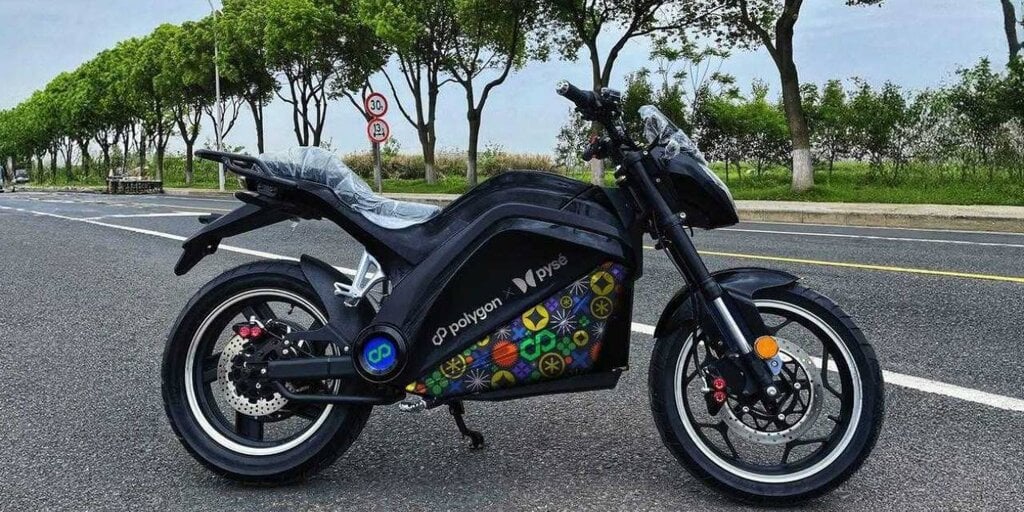Polygon Labs moves electric motorcycles on the chain in Dubai and India is perhaps the next one.
The Ethereum Layer-2 scale solution works together with sustainable infrastructure to start a fleet of electric delivery vehicles in Dubai, using Polygoon Blockchain to anchor asset property and real-time data collection.
The newest trip from polygon to tokenized infrastructure wants to combine stable, income -generating electric vehicles with dynamic data income on dynamic data, while the basis is laid for a large extension in the India -Growing Electric Vehicle (EV) sector.
“One of the greatest focus[es] Because polygon is real-world assets, “said Aishwary Gupta, Polygon’s worldwide head of payment and liquidity, said Decrypt. “And we want to ensure that everything that can be tokenized finds its way to Polygon.”
Putting environmental data on the chain
Each motorcycle is equipped with PYSE’s own Depin Mining Machine (DMM), making the vehicle a junction for collecting data while routine deliveries execute.
The device collects urban statistics such as air quality, road clothing and sound pollution and feeds that information on the chain. Rewards are distributed via token stimuli verified by partner protocols.
“This is a combination of two worlds,” said Harshit Garg, co-founder of Pysse, said Decrypt. He described the initiative as “real yield by green assets and the speculative advantage of decentralized data.”
GARG noted that PYSE is tackling the financing gaps in green mobility and also lays the foundation for ‘infrastructure for a decentralized, data-rich mobility economy’.
This combination of proceeds supported by RWA and Depin (decentralized physical infrastructure network) Token stimuli enables contributors to earn both the active and the data output.
First Dubai, next India
According to the companies, the rollout of Dubai is just the beginning and the Indian electric mobility sector, which grows 18% annually, is the next target.
“The B2B EV and the last mile logistics market in India is fragmented and under -financed,” said Garg, adding that blockchain -supported models can help operators gain access to “financing sources that go beyond traditional institutions.”
The tokenization frame of PYSE makes a fractional co-ownership of EV-Activa possible, with income exchange based on use and contract conditions.
The vehicles used are already working under fixed lease agreements in the VAE, so that the RWAs are anchored with stable returns. At the same time, the DMM adds a speculative layer, mining tokens that can be earned by collecting high-quality, verified data.
Although the Crypto Regulation of India remains ambiguous for the time being, Gupta has said that the role of polygon in this project is infrastructure.
“Polygon is just a blockchain platform where the tokenizing takes place,” he said. “PYSE would work to guarantee compliance.”
Gupta said that the company’s infrastructure is evolving to meet the needs of activa classes such as Tokenized EVs.
“There are a few RWA -based L2S using Polygon CDK,” he said. “Lumia and Libre, for example, are on RWA-oriented CDKs,” referring to adapted Layer-2 chains built with Polygon’s Chain Development Kit.
India “Ripe” for Depin
PYSE is planning to start his India extension with Last-Mijl Logistical Fleets before he moves to Ride-Hailing and Mid-Mijl delivery.
“The Indian market is ripe for the Depin segment,” Garg explained. “Given the growing scale in India, the first phase starts with last-mile delivery. The same model can be extended to row-hailing and first mile delivery segments immediately afterwards.”
Data collected by the DMMs in Dubai is already provided to insurance companies, OEMs and logistics providers in exchange for their native tokens.
“Hard distribution changes based on the quality of data, the use of the vehicles, etc., and therefore for any case, Garg said.” However, we ensure that every connected party benefits from the DMM layer. “
Gupta explained that this live use model solves a long-term problem with RWA implementations. Most tokenized assets so far, such as real estate or bonds, are static. The model of PYSE, he said, introduces real-time data collection and yield “next phase” for RWAS.
To discourage spam or manipulation, reward PYSE’s Depin modules fresh, high -quality inputs, “said Garg.” It’s not about volume – it’s about value. “
To guarantee integrity, PYSE says that his modules have been developed with vehicle manufacturers and “register all data on chains before any processing”. “For DMM modules:” Partner protocols verify independent data authenticity before they distribute rewards to our nodes. “
In the long term, Pysse wants to build a decentralized “Data Dao” to enable stakeholders to rule, earn and trade data. Garg said that the question is already clear with logistics and OEM partners, and that Indian urban data has value “not only locally but in Southeast Asia.”
Gupta sees projects such as PYSEs as a potential gateway for wider blockchain acceptance in India, especially in sectors that are far beyond finance.
“The successful EV tokenization of Pysse in the VAE is a strong proof of blockchain’s real potential,” he said. “As soon as the regulatory frameworks grow up in India, this model can become a valuable addition to the growing web3 ecosystem of the country.”
Daily debrief Newsletter
Start every day with the top news stories at the moment, plus original functions, a podcast, videos and more.

